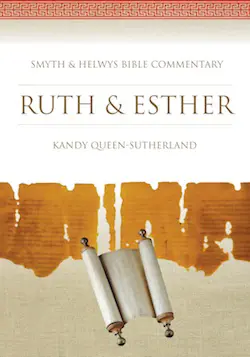

Ruth and Esther
in Smyth & Helwys Bible Commentary
Pages
544
Publisher
Smyth & Helwys
Published
2016
ISBN-13
9781573128919
Ruth and Esther are the only two women for whom books of the Hebrew Bible are named. This distinction in itself sets the books apart from other biblical texts that bear male names, address the community through its male members, recall the workings of God and human history through a predominately male perspective, and look to the future through male heirs. These books are particularly stories of survival. The story of Ruth focuses on the survival of a family; Esther focuses on the survival of a people.
As biblical characters, Ruth and Esther are women of their time—and are likewise women for all time. Each conforms to the cultural norms of their story’s setting while pressing against boundaries of domination and privilege that limit female and outsider participation.
As female characters, Ruth and Esther stand in a long line of biblical women who emerge as heroes in their stories. Each is a part of ancient Israel’s larger story of what it means to be and live as people of God.
As biblical characters, Ruth and Esther are women of their time—and are likewise women for all time. Each conforms to the cultural norms of their story’s setting while pressing against boundaries of domination and privilege that limit female and outsider participation.
As female characters, Ruth and Esther stand in a long line of biblical women who emerge as heroes in their stories. Each is a part of ancient Israel’s larger story of what it means to be and live as people of God.
Collections
This book appears in the following featured collections.
- Commentaries by Female Scholars by John Dyer
- Top Old Testament Commentaries by Crux Sola (Nijay Gupta's Blog)
Reviews
This commentary is beautifully written and well organized with a methodological focus on intertextuality. The introduction gives attention to Ruth and Esther in the Megillot, text-critical issues, possible genre designations, and details its canonical history. This commentary highlights connections with indigenous readings of Ruth, along with Ruth’s reception history in film, literature, and art.
[Full Review]
This work has some good insights into the book of Esther, however, the author's politics creep in to the point that the book is not helpful in many section. For instance, in the exegesis on chapter 1 the focus becomes feminism and gender roles rather than the providence of God at work. In the third chapter, the author's politics come out even more when she attacks American culture's laws on birth control and abortion.
Though in general SHBC is a good series, I might skip this work in favor of other authors with similar levels of insight that do not bring politics into play.

